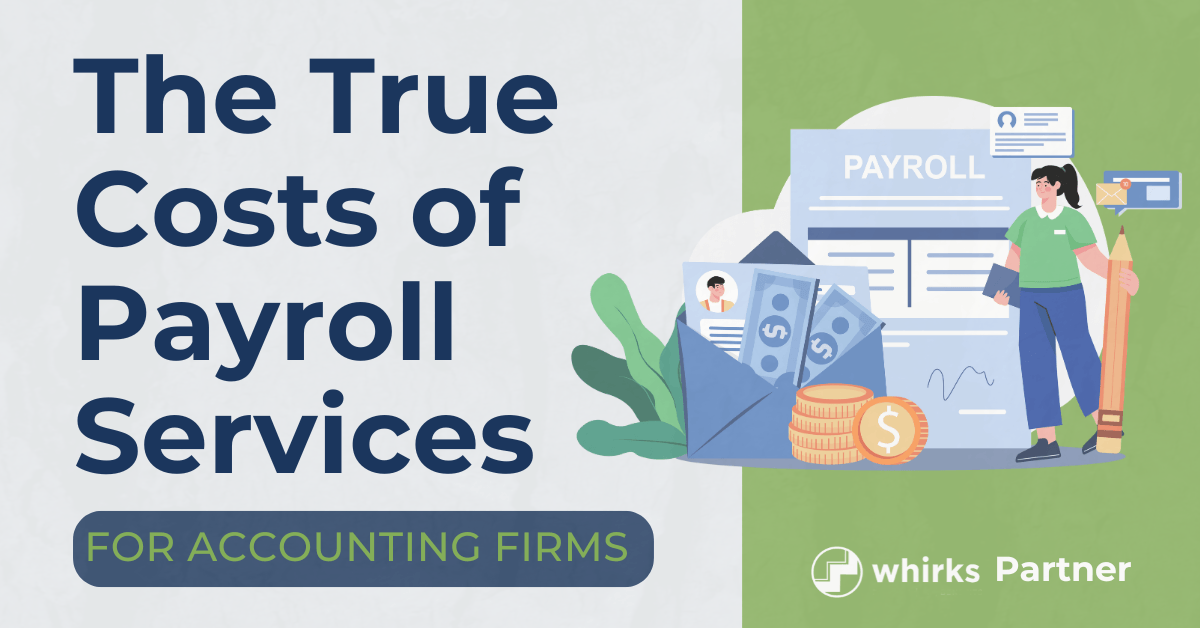
For many small accounting firms, offering payroll services feels like something they have to do.
Clients expect it, so you just figure out a way to make it work. But when you break it down, payroll might be costing you more than you realize—both financially and in terms of stress.
So, is payroll truly profitable for your firm? Or is it quietly robbing you blind?
If you’re considering outsourcing payroll for your clients, here’s what you need to know about the hidden costs and complexities of handling payroll in-house.
Why Payroll Feels Like a Must-Have but Can Quickly Become a Burden
For many small accounting firms, payroll looks like a necessity but ends up being a costly distraction.
When I first started my accounting firm, I assumed payroll was just part of the job. My clients expected it, and I didn’t have any good alternatives to offer them. So we did payroll—because we thought we had to.
At the beginning, it felt manageable. But as we grew—15, 20, even 30 payroll clients—it became a different story. It wasn’t efficient anymore, and it certainly wasn’t stress-free. At that point, we realized we needed someone dedicated to payroll, even if it wasn’t their full-time role.
The Costs You Might Be Missing
Payroll isn’t just about running numbers and sending out paychecks. It comes with real costs—many of which aren’t obvious when you’re starting out.
Labor Costs Add Up
Small firms offering payroll typically have one person handling it. This could be a bookkeeper, an admin, or even a dedicated payroll person. Depending on their role, they’re earning anywhere from $17 to $30 per hour. That’s a significant cost, and it doesn’t even include payroll taxes or benefits for that employee.
But here’s where it really starts to hurt: if you’re not running payroll efficiently, this person’s time gets wasted on constant deadlines, troubleshooting, and inefficiencies.
Software Isn’t Cheap Either
Then there’s the software. Whether you’re using Gusto, QuickBooks, ADP Run, or something like Thomson’s ACS, your payroll software fees can eat up 20% to 50% of your payroll revenue.
And if you’re using a platform like Thomson’s, you might also face extra fees for ACH processing, web portals, and other services.
These costs don’t go down just because you’re a small firm. You’re paying the same as bigger practices without reaping the same economies of scale.
Liability Is on Your Shoulders
Payroll also comes with risks. If a direct deposit gets messed up or the IRS misapplies a payment, that’s on you. Your firm assumes the liability, and there’s very little protection if something goes sideways.
And when things go wrong, they can go really wrong. For example, what happens if your payroll person is out sick, or the software crashes? Deadlines don’t stop. Clients expect paychecks on time, and if you miss a step, you’re dealing with angry clients—or worse, losing them entirely.
Are You Actually Making Money?
Most small firms aren’t making money on payroll. When we run the numbers, we see this over and over.
If your payroll revenue is less than $250,000 a year, you’re probably just breaking even—or, more likely, losing money.
The problem comes down to inefficiencies. When you don’t have tight processes, payroll eats up time and creates stress for you and your team. There’s always another deadline: tax payments, quarterly filings, or fixing notices that pop up out of nowhere. It’s an endless cycle that costs you more than it’s worth.
There has to be a better way, right?! Thankfully you've got a couple of options.
What Are Your Options?
If payroll is draining your resources and your team, it’s time to rethink how you’re doing it. You don’t have to go all-in or give it up entirely—there are smarter ways to handle it.
1. Outsource Payroll Completely
One option is to outsource payroll to a provider like ADP or a local specialist. They handle the day-to-day responsibilities while you keep your client relationships intact.
Another approach is to sell your payroll practice outright to another provider. This lets you offload the responsibility and focus on the services you do best.
2. Partner with Experts
At Whirks, we’ve built systems to help firms like yours get out of the payroll hole. If you want to keep offering payroll but without all the headaches, we can step in.
We handle the back-office taxes, ACH fees, and all the messy redundancy issues that come with running payroll. When you partner with us, we give you the tools and support you need to say “yes” to payroll clients without sacrificing your margins.
And if you’re tired of payroll altogether, you can refer clients to us. You still get access to all the reports and data you need for accounting, and once you’ve referred enough clients, we even pay you for it.
3. Tighten Up Your In-House Operations
If outsourcing doesn’t feel right for you, then it’s time to tighten up your in-house operations. Invest in better software, train your team thoroughly, and set up clear backup plans so payroll doesn’t fall apart when something unexpected happens.
This option isn’t easy, but if done right, it can make payroll profitable again.
Payroll has the potential to add real value to your firm.
It strengthens client relationships and makes accounting processes easier. But the truth is, most small firms aren’t running it efficiently enough to make it worthwhile.
Take a hard look at your numbers and processes. Are you really making money, or are you just doing payroll because you think you have to? It’s okay to rethink how you approach it.
Whether you outsource, partner, or overhaul your system, the goal should be to stop letting payroll drag you down—and instead, turn it into something that works for you.
If you’re ready to stop losing sleep over payroll, we’d love to help.
Topics:
